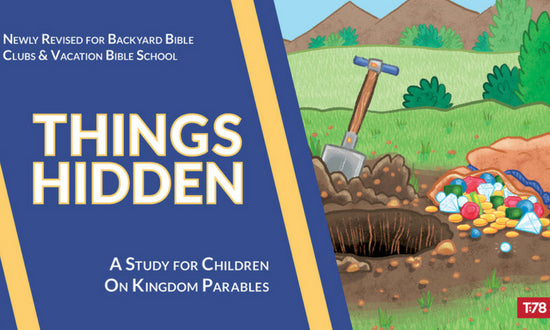Have you ever looked at a Magic Eye™ picture? The page is covered with repeated designs that are very apparent to any viewer. But, for those who have eyes to see in a new way, you can also see a three-dimensional hidden picture. Many people never see the hidden picture. They only see the surface picture and never really understand that there is a more beautiful picture within the easily seen picture. So it is with Jesus’ parables. Beyond the mere words of the parables are deep, hidden spiritual truths—truths like the Kingdom of God is a treasure worth more than all we have, God welcomes repentant sinners with great celebration, and God seeks the lost.
These truths are hidden truths unless one has been given the spiritual eyes to see and ears to hear them. Their beauty and worth are denied, misunderstood, or rejected by those whose eyes are blind and ears are deaf to spiritual truth. To see and hear the hidden things of God requires spiritual eyes and ears. Hunger for spiritual truth requires awakened senses, and to love the things of God requires a new heart. (See Ezekiel 11:19 and 36:26.) God alone is the source of spiritual eyes and undivided hearts. Only He can make blind eyes see, deaf ears hear, dead taste buds hunger, and hardened hearts soft.
It is my prayer and desire that through this brief study of some of the parables of Jesus—earthly stories with hidden meaning about the Kingdom of God—God may be pleased to open the eyes of the blind, heal the ears of the deaf, and soften the hearts of the hardened. The thoughts above are expressed in the preface of the Backyard Bible Club/Vacation Bible School curriculum, Things Hidden. Perhaps you have taught the material and have seen the power of the Word of God to open a child’s eyes to spiritual truth. Perhaps you have had the privilege of seeing God at work through His Word to create spiritual hunger in a child… or the unparalleled joy of seeing a child’s heart respond in simple faith. If so, you know that the parables in the Bible are powerful. Might you want to be part of imparting these great spiritual truths to a group of children in your neighborhood or your church? If so, you may consider exploring the newly revised version of Things Hidden.
See all the Truth78 curriculum options for VBS/BYBC
Discover the Revised Things Hidden Curriculum
What's new about it?
Reformatted lessons

Lessons match our Sunday school curriculum format to make it easier to teach. Page flow has been improved with clearly indicated visuals and easy to follow teaching instructions and text. In addition, lesson concepts are more clearly explained and the application section has been expanded and improved.
All new visuals and additional resources

The visuals for Things Hidden are all new designs with original illustrations. Several additional resources are also included such as a puppet show script and promotional posters and postcards to invite people to your VBS or Backyard Bible Club.
New student project
 The student project for the curriculum is now a treasure box with images of parables on the inside for children to color. Once it's colored, students can fold it into a box. The box is full color (wood grain) on the outside and black and white on the inside for kids to color. Each lesson has 4 Treasure cards children can fill out and add to their box:
The student project for the curriculum is now a treasure box with images of parables on the inside for children to color. Once it's colored, students can fold it into a box. The box is full color (wood grain) on the outside and black and white on the inside for kids to color. Each lesson has 4 Treasure cards children can fill out and add to their box:
- Memory Verse Cards - children can decorate with stickers or draw pictures on to remind them of the lesson
- Lesson-Specific Treasure Cards - children may attach a treasure to remind them of the parable in the lesson (a seed, a pearl, etc.)
- Reflection Cards - children think about an application question and write a response.
- Additional Treasure Cards - children can look around their everyday surroundings and collect things from nature, wisdom from parents, or Bible verses and share what they’ve found on the card.
To assist leaders in discussing the Gospel at a deeper level with the children they interact with, the booklet Helping Children to Understand the Gospel is included in the kit.
What hasn’t changed?
The rich five-lesson content remains the same as well as the intentional use of Bible verses and passages. See sample lesson







